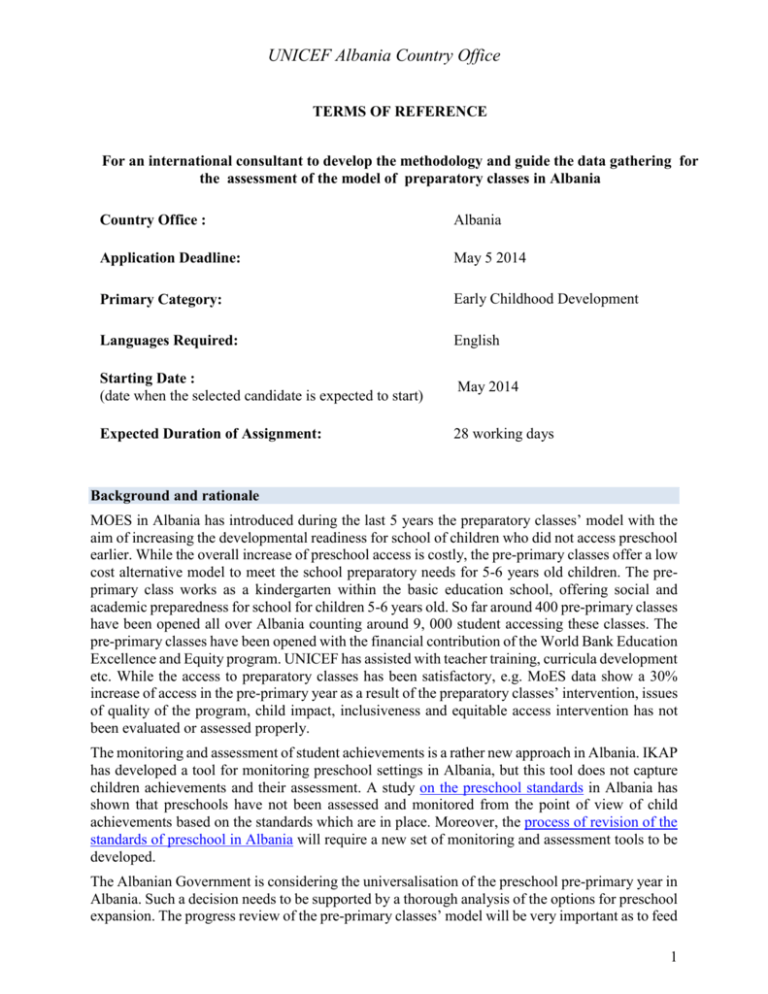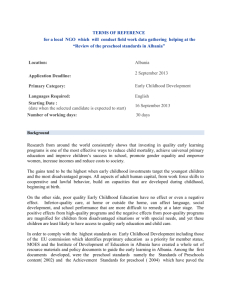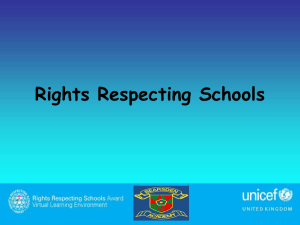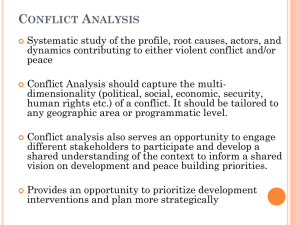Terms of Reference - European Evaluation Society
advertisement

UNICEF Albania Country Office TERMS OF REFERENCE For an international consultant to develop the methodology and guide the data gathering for the assessment of the model of preparatory classes in Albania Country Office : Albania Application Deadline: May 5 2014 Primary Category: Early Childhood Development Languages Required: English Starting Date : (date when the selected candidate is expected to start) May 2014 Expected Duration of Assignment: 28 working days Background and rationale MOES in Albania has introduced during the last 5 years the preparatory classes’ model with the aim of increasing the developmental readiness for school of children who did not access preschool earlier. While the overall increase of preschool access is costly, the pre-primary classes offer a low cost alternative model to meet the school preparatory needs for 5-6 years old children. The preprimary class works as a kindergarten within the basic education school, offering social and academic preparedness for school for children 5-6 years old. So far around 400 pre-primary classes have been opened all over Albania counting around 9, 000 student accessing these classes. The pre-primary classes have been opened with the financial contribution of the World Bank Education Excellence and Equity program. UNICEF has assisted with teacher training, curricula development etc. While the access to preparatory classes has been satisfactory, e.g. MoES data show a 30% increase of access in the pre-primary year as a result of the preparatory classes’ intervention, issues of quality of the program, child impact, inclusiveness and equitable access intervention has not been evaluated or assessed properly. The monitoring and assessment of student achievements is a rather new approach in Albania. IKAP has developed a tool for monitoring preschool settings in Albania, but this tool does not capture children achievements and their assessment. A study on the preschool standards in Albania has shown that preschools have not been assessed and monitored from the point of view of child achievements based on the standards which are in place. Moreover, the process of revision of the standards of preschool in Albania will require a new set of monitoring and assessment tools to be developed. The Albanian Government is considering the universalisation of the preschool pre-primary year in Albania. Such a decision needs to be supported by a thorough analysis of the options for preschool expansion. The progress review of the pre-primary classes’ model will be very important as to feed 1 UNICEF Albania Country Office in some of the lessons learnt from the experience and best practices to be used from this intervention in the expansion of preschool plan from the Government. Overall objective of the assessment The consultant main task will be to develop the methodology for assessing the model of the preprimary classes based on UNICEF guidelines as well as offer technical expertise and guide the data gathering process by the local group in Albania. The methodology developed will need to capture the efficiency, effectiveness, relevance and sustainability of the intervention of introducing the preprimary model in the Albanian education system. The methodology will have to identify among the international recognized and tested tools for measuring child readiness in the Albanian context. Scope of Work It is expected that the selected individual will start working on May 2014. She/he will liaise and report at all times with UNICEF assigned PO and Deputy Representative who will provide advice, guidance and information, as appropriate. The geography of the assessment will be defined by the methodology and it will have to consider equity issues and in more details how the vulnerable groups living in Albania access equitably the preprimary classes (e.g. the Roma www.sidalbania.org) Issues The methodology proposed will need to address the following issues: Has the preprimary classes ‘model been effective and efficient? Has the preprimary classes’ model been an equitable intervention ensuring equitable access to children from, low economic and social status as well as minority children? Is the program meeting the needs of the children who did not have possibility to access preschool prior to preprimary year? -What are the effects of the preprimary year in the social and academic preparedness of children for school? What are the outcomes of the preprimary classes compared with the control group, classical model of preschool with three years of attendance? -Is the preprimary school model a viable model for the universalization of the preprimary year in Albania? Methodology While developing the methodology, the consultant will have to make sure that: – Methodology and tools ensure the approach and data collection to be human /child rights based and gender sensitive (data disaggregation). Specific attention needs to be paid to the proposed methodology that will allow the inclusion of particularly excluded groups. Methodology will take into account the overall purpose of the assessment as well as the needs of the users and other stakeholders, and the budget available – Assessment methodology should demonstrate maximum use of existing relevant datasets, 2 UNICEF Albania Country Office – The methodology proposed will have to identify the data collection strategy; which methods will be used and how the data and findings will be analyzed, which stakeholders will be targeted etc. Work plan and deliverables No Deliverable Working days and tentative calendar Who 1. Desk review 3 days (from Consultant residence) 2. Visit in Albania’s preparatory classes and meeting 5 days (In with stakeholders. Prepare an inception report to be Albania ) presented to UNICEF and stakeholders as to which methodology/ tools to be used. 3. Develop the methodology and submit to UNICEF. 8 days(from Consultant residence) 4. Comment on the methodology proposed. 5 days 5. Incorporate comments from UNICEF and submit 3 days (from Consultant final methodology residence) 6. Offer technical expertise and coaching to the group 4 days(from Consultant who will conduct data gathering including structure residence) of the final report etc. through Skype, email exchanges etc. 7. Review and improve when necessary the final 5 days(from Consultant assessment report submitted by the local group of residence) experts. Consultant UNICEF Payment The assignment will be remunerated upon delivery of the agreed outputs. Payment will be made in three installments: 20% upon submission of inception report 40% upon the successful submission of the final deliverable 5 3 UNICEF Albania Country Office 40% upon deliverable 7 Required skills/experience Demonstrated experience of conducting research, assessments in social areas preferably on preschool; Advances studies in social sciences, child development psychology and or other related fields; Demonstrated statistical analysis skills; Good facilitation skills and demonstrated experience of conducting participatory assessments; Excellent writing skills in English; Knowledge of UNICEF criteria on studies/research will be an advantage. Interested individuals are requested to submit Letter of interest indicating the reasons why she/he is capable of implementing the assignment; Curriculum vitae Methodology outline which will including how the consultant intends to carry out the job Fee estimate based on man/day; Copies (or web-links to) of research work conducted in the past. Application procedure and selection criteria Applicants will be required to send to UNICEF Office to egorenca@unicef.org and copy to tirana@unicef.org and mbushati@unicef.org the above documents by the deadline of May 5 2014. The applicants will be selected based on their previous relevant experience, background, quality of the proposal and fee proposed. United Nations Children's Fund (UNICEF) Str. "Skenderbej", Volkswagen Building, 3rd floor, Tirana, Albania phone: +355 42 273 335/6/7/8/9 ext. 22 fax: +355 42 243 775/6 website: www.unicef.org/albania 4







